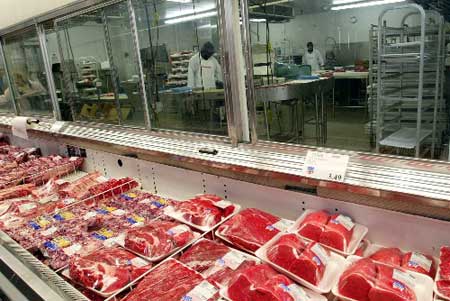Illegal beef floods market
|
|
|
China has banned beef imports from Japan since 2001 and from the United States since late 2003, because mad cow disease was found in those countries. [Global Times] |
A sharp increase in smuggled beef on the Chinese mainland is being attributed to a growing shortage in local supplies - a phenomenon that food analysts fear could put consumers' health in jeopardy, as much of the illegally imported meat comes from regions with mad cow disease.
China has banned beef imports from Japan since 2001 and from the United States since late 2003, because mad cow disease was found in those countries. The embargo on beef imports, however, has failed to prevent shipments from arriving indirectly through various channels in Hong Kong and Vietnam, according to Jim Peterson, chairman of the US Meat Export Federation, who was quoted by Bloomberg.
Official statistics on the amount of smuggled beef weren't available, but some reports have suggested that at least 100,000 tons of it have entered the country since 2008 through illegal channels, mainly from Brazil and the US, according to the Irish Independent, citing a United States Department of Agriculture report.
China's beef imports, which tripled last year, look to jump a further 30 percent to 30,000 tons in 2010, agrimoney.com reported.
Beef demand in China is likely to rise to 7.4 million tons in 2015, up 23 percent from 6 million tons in 2008, said Pan Chenjun, an analyst of food and agriculture with the Beijing bureau of the Amsterdam-headquartered Rabobank.
"Beef production in China stands at 6 million tons per year. It is unable to keep pace with the growing domestic-market demand that has contributed to the emergence and rising trend of beef smuggling in the country," Pan told the Global Times.
Mad cow disease, or Bovine Spongiform Encephalopathy (BSE), is a transmissible, neu-rodegenerative, fatal brain disease found in cattle, according to the World Health Organization.
Pork, which is cheaper than beef, has long been the meat of choice for the predominately Han Chinese, accounting for 60 percent of their total meat consumption, reports said. Growing affordability due to a general increase in incomes and demands on food varieties are believed to have contributed to the boom in beef consumption.
In Beijing, the price of domestic-produced beef is sold at an average of 40 yuan ($5.85) per kilogram, while the price of smuggled beef could be as low as 25 yuan.
In Guangzhou, a mainland city located just 120 kilometers from Hong Kong, smuggled cattle meat from the US is popular among locals due to its cheaper price, the Southern Metropolis Daily reported.
An employee in the sales department of a Qingdao-based trading company, who spoke on the condition of anonymity, told the Global Times that importing beef from the US and Canada is part of their business.
"All US-produced beef sold in the mainland market is smuggled through Hong Kong. A large part goes to restaurants," he said.
"The smuggled beef is safe to eat since the meat is tagged with official quality-inspection and quarantine certificates. The imported beef is cheaper and tastes better than the domestically produced," he insisted.
Back in 2008, law enforcement officials in Dongguan city destroyed more than 100 tons of illegally imported beef, half of which was from mad cow disease-affected areas, the Guangzhou Daily reported.
The Shanghai-based Oriental Morning News reported in July that Kobe beef being served in the Chinese market had been smuggled.
The continued illegal entry of beef into China has become a matter of public concern.
"I have bought only beef produced domestically in the supermarket since mad cow disease broke out. But when I eat in restaurants, it's hard to know if the beef is safe," Zhang Rui, a consumer in Beijing, told the Global Times.
Fan Zhihui, a food-safety expert at China Agriculture University, told the Global Times that "There is great risk behind the smuggled beef that enters the Chinese market without quality inspection and supervision."
Fan warned that Chinese consumers should be cautious in purchasing beef, since they might contain fatal viruses.
"Relevant departments should enhance supervision to prevent such meat from enter-ing China," she urged.
 0
0 








Go to Forum >>0 Comments